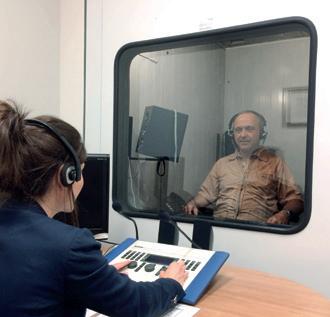
2 minute read
BECOMING AN AUDIOLOGIST
Becoming an
AUDIOLOGIST
According to the Ordre des orthophonistes et audiologistes du Québec (OOAQ), an audiologist is “an expert in hearing and the vestibular system. They’ve trained in anatomy, physiology, neurology, linguistics, psychology, and the function and disorders of the auditory and vestibular systems. They work with people of all ages, from newborns to seniors.” Among others, that means audiologists can address auditory and balance problems (like comprehension problems, tinnitus, and vertigo) because they know how to examine the structures of the ear.
Knowledge and Skills
Audiologists need to have a Master’s degree in order to practice. It should also be noted that audiology is a reserved profession. It means that in order to practice, an audiologist needs to be a member of the Ordre des orthophonistes et audiologistes du Québec. The OOAQ’s primary mission is to protect the public, and part of that involves making sure that practicing audiologists have the right knowledge, skills, and ethics. Audiologists also need to be empathetic and have good listening, communication, analytical, and logical skills. During an appointment, audiologists need to take the time to understand their patients’ difficulties, whether they be social, professional, or other, so that they can find the best solutions for each person. Audiologists use their training to assess and understand possible causes of balance or hearing issues, as well as their short- and long-term consequences. That training also helps them identify possible aggravating factors of the patient’s condition. On a typical day, audiologists are tasked with finding the best solutions for their patients. Those solutions can vary widely, and the audiologist needs to consider more than just the data they collect during an exam. They also need to consider the patient’s specific concerns. When necessary, hearing aids are combined with the use of other complementary solutions (communication strategies, rehabilitation, desensitization therapy, etc.).

Working as a Team
Naturally, teamwork is a big part of an audiologist’s job. Every day, they work with other professionals (ENT specialists, audioprosthetists, speech-language pathologists, specialized educators, etc.) and resources (rehabilitation centres, associations, etc.) to help patients find solutions.
Audiologists are your go-to if you need help with a hearing or balance problem. Seeing an audiologist can do more than just prevent problems, too—it can help improve your quality of life!
Brigitte Sauvageau
Audiologist practicing at the Montreal Lobe clinics
Reference 1. Ordre des orthophonistes et audiologistes du Québec. Qui est l’audiologiste?.
Online. https://www.ooaq.qc.ca/consulter/audiologiste/definition-audiologiste/. Consulted on November 2, 2020.







